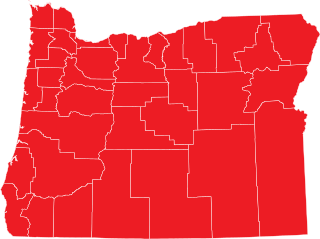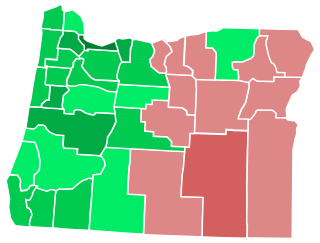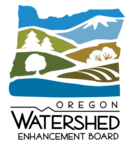Measure 28 was a ballot measure, referred by the legislature of the U.S. state of Oregon in 2003. It would have created a temporary one-percent increase in Oregon's income tax. The tax was proposed as a way to overcome deficits to the state budget. The measure was defeated in the January 28, 2003 special election with 575,846 votes in favor, 676,312 votes against.
Ballot Measure 30 of 2004 would have created a surcharge on Oregon's income tax, raised the minimum tax corporations pay in Oregon income taxes, and made other changes to the tax code to increase revenues. Similar to the previous year's defeated Measure 28, it was proposed as a way to avoid state budget cuts caused by a deficit. The measure was defeated in the February 3, 2004 special election, with 418,315 votes in favor, 691,462 votes against.
The Oregon tax revolt is a political movement in Oregon which advocates for lower taxes. This movement is part of a larger anti-tax movement in the western United States which began with the passage of Proposition 13 in California. The tax revolt, carried out in large part by a series of citizens' initiatives and referendums, has reshaped the debate about taxes and public services in Oregon.

Prior to the Supreme Court's decision in Obergefell v. Hodges (2015), U.S. state constitutional amendments banning same-sex unions of several different types passed, banning legal recognition of same-sex unions in U.S. state constitutions, referred to by proponents as "defense of marriage amendments" or "marriage protection amendments." These state amendments are different from the proposed Federal Marriage Amendment, which would ban same-sex marriage in every U.S. state, and Section 2 of the Defense of Marriage Act, more commonly known as DOMA, which allowed the states not to recognize same-sex marriages from other states. The amendments define marriage as a union between one man and one woman and prevent civil unions or same-sex marriages from being legalized, though some of the amendments bar only the latter. The Obergefell decision in June 2015 invalidated these state constitutional amendments insofar as they prevented same-sex couples from marrying, even though the actual text of these amendments remain written into the state constitutions.
The California State Coastal Conservancy is a state agency in California established in 1976 to enhance coastal resources and public access to the coast. The CSCC is part of the California Natural Resources Agency.

Bill Bradbury is an American politician from the US state of Oregon. A native of Illinois, he grew up in Chicago and Pennsylvania before moving to the West Coast where he worked in broadcast journalism before running for public office. A Democrat, he served as Oregon Secretary of State from 1999 to 2009, and ran for Governor of Oregon in 2010. Bradbury previously served in the Oregon Legislature from 1981 to 1995. In 2010 he was appointed to the Northwest Power and Conservation Council by Oregon Governor Ted Kulongoski. He resides in Bandon, Oregon.

Oregon ballot measure 48 was one of two unsuccessful ballot measures sponsored by the Taxpayers Association of Oregon (TAO) on the November 7, 2006 general election ballot. Measure 48 was an initiated constitutional amendment ballot measure. Oregon statute currently limits state appropriations to 8% of projected personal income in Oregon. If Governor declares emergency, legislature may exceed current statutory appropriations limit by 60% vote of each house. This measure would have added a constitutional provision limiting any increase in state spending from one biennium to next biennium to the percentage increase in state population, plus inflation, over previous two years. Certain exceptions to limit, including spending of: federal, donated funds; proceeds from selling certain bonds, real property; money to fund emergency funds; money to fund tax, "kicker," other refunds were included in the provisions of the measure. It also would have provided that spending limit may be exceeded by amount approved by two-thirds of each house of legislature and approved by majority of voters voting in general election.

Elections in Oregon are all held using a Vote by Mail (VBM) system. This means that all registered voters receive their ballots via postal delivery and can vote from their homes. A state Voters’ Pamphlet is mailed to every household in Oregon about three weeks before each statewide election. It includes information about each measure and candidate in the upcoming election.
The Water Resources Development Act of 1999, Pub.L. 106–53 (text)(pdf), was enacted by Congress of the United States on August 17, 1999. Most of the provisions of WRDA 1999 are administered by the United States Army Corps of Engineers.

The 75th Oregon Legislative Assembly convened beginning on January 12, 2009, for its biennial regular session. All of the 60 seats in the House of Representatives and half of the 30 seats in the State Senate were up for election in 2008; the general election for those seats took place on November 4.

The November 6, 2007, Special Election, was an off-year election in which no members of the Congress, statewide offices, or members of the Oregon Legislative Assembly were scheduled for election. However, two statewide measures were referred by the legislature to the 2007 November Special Election ballot. While there were only two issues on the ballot, they touched on important enough issues that they attracted one hundred seventy-five arguments in total, both in favor of, and against them in the voter's pamphlet.

Measures 66 and 67 are two ballot referenda that were on the January 26, 2010 special election ballot in the US state of Oregon, which proposed tax increases on corporations and on households making US$250,000 and individuals making $125,000 to help balance the state's budget. The measures referred two bills passed by the Oregon state legislature on June 11, 2009, and signed by Governor Ted Kulongoski on July 20, 2009, to the voters for approval. They were approved and became effective February 25, 2010.

General elections were held in Oregon on Tuesday, November 2, 2010. Primary elections took place on May 18, 2010.

Oregon Ballot Measure 100, titled the Wildlife Trafficking Prevention Act, is a ballot measure in the 2016 election in the U.S. state of Oregon. The measure prohibited the purchase, sale, or possession with intent to sell products and parts from specified nonnative wildlife species, specifically elephant, rhinoceros, whale, tiger, lion, leopard, cheetah, jaguar, pangolin, sea turtle, shark, and ray. The ballot measures created several exceptions for activities for law enforcement purposes, activities authorized by federal law, transfers of certain antiques and musical instruments, certain donations for scientific or educational purposes, and non-commercial transfers through gifts or inheritance, and well as for possession by enrolled members of federally recognized tribes. The ballot measure largely banned, among other things, the ivory trade in the state.

California state elections in 2018 were held on Tuesday, November 6, 2018, with the primary elections being held on June 5, 2018. Voters elected one member to the United States Senate, 53 members to the United States House of Representatives, all eight state constitutional offices, all four members to the Board of Equalization, 20 members to the California State Senate, and all 80 members to the California State Assembly, among other elected offices.

Oregon's Emergency Board is a statutory legislative committee composed of members of both houses of the Oregon Legislative Assembly. It has broad powers to allocate general fund resources, lottery revenue, and other state funds for unanticipated government requirements when the state legislature is not in session. The board can authorize an agency to overspend its approved budget or approve a new budget amount for specific agency tasks. It can also authorize the transfers of funds between agencies or budget accounts. The Emergency Board is jointly chaired by the President of the Oregon Senate and the Speaker of the Oregon House of Representatives.

A general election was held in the U.S. state of Oregon on November 3, 2020. Primary elections were held on May 19, 2020.

California Proposition 68 was a legislatively referred constitutional amendment that appeared on ballots in California in the June primary election in 2018. It was a $4.1bn bond measure to fund parks, environmental projects, water infrastructure projects and flood protection measures throughout California.








